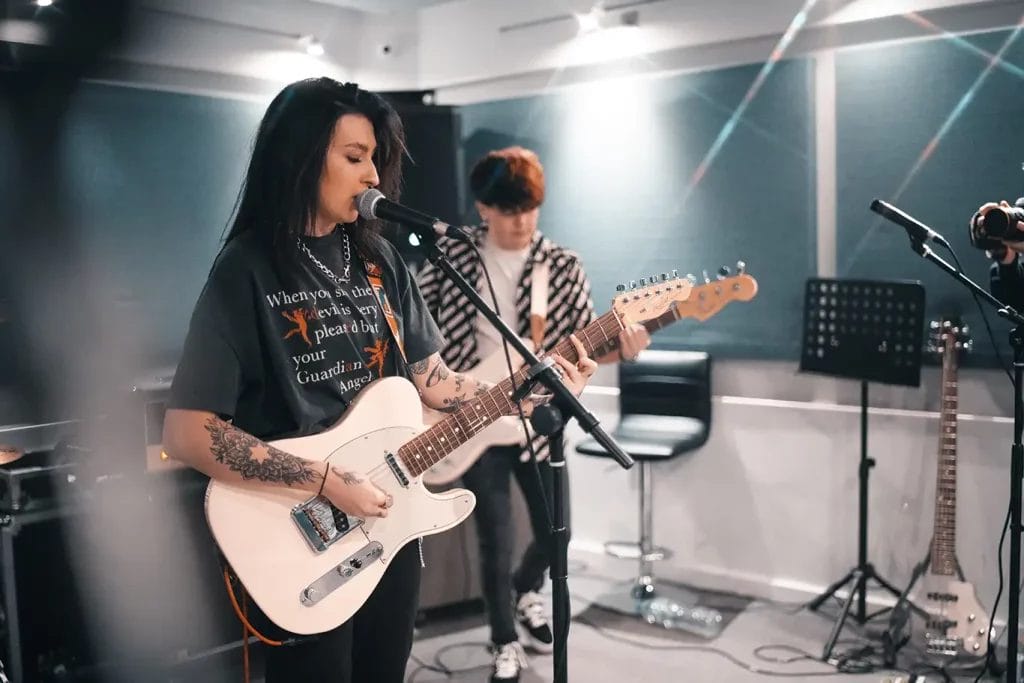Do you daydream about being on stage with your band, playing in front of a crowd of adoring fans who know all the words to your songs?
You’re not alone—wanting to be in a band is a common dream for musicians, but not everyone chases this dream because it’s a lot of work and difficult to know where to start. Even if you’ve already gotten your band together, booking your first gigs can be very intimidating.
To help make your journey to the stage a little simpler, we’re breaking down the steps to starting a band if you haven’t already, as well as some tips and tricks for booking shows.
Starting Your Band
Every band has its own unique “how we got together” story, but there are a few things all bands can do to set themselves up for success from the very beginning. Here are seven tips for getting started!
1. Find the Right Band Members
This step may sound simple, but anyone who’s tried to form a band can attest to how difficult it can be. After all, your bandmates aren’t just people you jam out with—they’ll be your business partners.
The kind of musicians you want to find for your band will differ depending on what genre of music you want to play. For example, if your band has a heavy jazz influence, you’ll want some horn players in your group to achieve that sound. If you only want to create instrumental music, you don’t need to worry about recruiting a vocalist.
You may already have some friends or acquaintances in mind to bring into the band, but if you’re in need of a specific musician or are starting from scratch, you can use sites like MusicianFinder or Join-a-Band to recruit musicians in your area.
Facebook groups for musicians are another great place to start—just join a local group and write a post that includes what kind of musician you’re looking for, what type of music your band wants to make, and any other details that they should know about before auditioning.
Perhaps more important than finding uber-talented musicians to join your band is finding people who are a good personality fit and have a strong work ethic. Practice makes perfect when it comes to playing an instrument, but chemistry is something you either have or you don’t.
2. Decide on a Genre
Once you have your band together, discuss your major musical influences. Have any members already written music before? Give it a listen as a group. If there are multiple songwriters in your band, chances are your sound will end up being a blend of your preferred musical styles.
Your sound will also emerge naturally the more you play together, so don’t force it! Remember that your musical style will most likely evolve and change over time. Consider how different Coldplay’s first albums sound from their most recent work, for example. Experimentation is part of a band’s life cycle, so embrace wherever you are sound-wise and be open to change.

3. Pick a Band Name
Coming up with a great band name is an important step in establishing your band’s identity and brand. Your band name can be just about anything you want it to be, but try to pick something that is relatively easy to pronounce and spell. You want to make sure people can find you easily on Google or on streaming platforms, after all!
The inspiration for your band name can come from any number of places. The band Fall Out Boy asked their audience for name suggestions early in their career and someone suggested the name of Homer’s favorite superhero from The Simpsons. Rivers Cuomo, the frontman of Weezer, has asthma, and his childhood friends used to call him “Weezer.”
Ask everyone in the band to come up with a list of ten names they like and go over them as a group to see if there’s at least one everyone likes. Make sure to do a quick Google search for any names you like to see if there are any other bands going by the same name—Blink-182 was originally named Blink until they were sued by an Irish band of the same name.
4. Design Your Band Logo
Think of some of the most iconic music acts in history—The Beatles, Metallica, The Strokes, Wu-Tang Clan, and Radiohead, for example. What do they all have in common? They have easily recognizable logos as part of their branding.
Of course, not all bands have logos, but having a logo can be a great way to spread recognition about your band if you put it on your merch, album art, stickers, and show posters. Even if your logo is something as simple as creating a custom font for your band name, you can easily make yourself look more established and serious as a group if you use your logo consistently.
You can create your own logo using Adobe or Canva, or consider hiring a professional designer to create one for you.
5. Create a Band Agreement
Being in a band can be a ton of fun, but it’s important to get down to business sometimes. Coming up with a band agreement is a great way to make sure everyone’s on the same page when it comes to how your band is going to function and hopefully avoid disagreements or drama down the line.
This doesn’t need to be a legally binding contract, but it should be something every member takes seriously and agrees to honor. Here are a few points a good band agreement includes:
- Time Commitment: Decide on what a realistic rehearsal schedule looks like for your band. How many hours a week can you dedicate to band practice or playing shows? What days of the week work best for everyone? Everyone has their own time commitments, whether that’s a job, school, or family, and while evenings might work well for one person they could be impossible for someone else. Agree on a schedule that works for everyone.
- Responsibilities: Naturally, every band has a leader. That might be the person who assembled the band, or it could be someone else who has the natural leadership skills and personality needed to represent your band. Will the band leader also be responsible for booking shows, at least until you can afford a band manager who can take care of these tasks for you? Which member will be responsible for keeping track of the band’s finances? Who will manage your social media accounts? These are all questions worth discussing with your band.
- Finances: Talking about money can be uncomfortable and maybe even feel strange if you haven’t made any yet, but it can cause a lot of problems down the line if you don’t have these conversations. Will your band have a pool of money that each member contributes to, and anything you need to pay for comes out of that fund? How will each of your members get paid and how much will they make? Ownership of your music should also warrant a discussion—are the publishing rights to your music split evenly amongst the members or do the songwriters get a bigger cut?

6. Get the Right Gear
Chances are, you won’t be starting from scratch here—the bassist probably already owns a bass, for example. However, the kind of equipment you need as a band differs from what you need when you’re just jamming alone in your bedroom.
While this will also differ depending on what kind of music you make, here are some good basics to start with:
- Microphone and stand
- Guitar and bass amplifiers
- PA system and stage monitors (if you need to bring your own to a gig)
- Cables (instrument, speaker, and microphone)
Especially in the early days when you’re playing smaller shows, you may be responsible for bringing a lot of your own sound equipment to the venue. If you aren’t well-versed in this kind of gear, going to a music equipment store and talking with associates there about what they recommend can be a huge help.
7. Start Writing Songs Together
When you form a band, there are some unglamorous tasks to take care of upfront, but finally getting down to business and writing your own songs together is what it’s all about.
Be prepared for this to feel a little awkward at first, especially if none of you have ever written songs together before. It’ll get easier with time, but don’t be hard on yourselves if the first handful of songs you write together aren’t very good. Even wildly successful bands have songs they write that never see the light of day.
Once you have some music you’re proud of, record it and release it online on popular platforms like Spotify and Apple Music. Having music online that you can promote will make it easier to garner a listener base, and you’ll have a place to send promoters and venues when you’re trying to book gigs down the line.
Booking Gigs for Your Band
Know the Basics of Gig Booking
In the early days of your band, you’ll be responsible for finding and booking shows. This will usually involve reaching out to a promoter.
A promoter’s job is to organize the event or concert and book the talent, and they may either work for a specific venue or for an entertainment organization that works with multiple different venues to put together shows.
While it might be tempting to reach out to anyone and everyone for the chance to perform, you should think carefully about what venue size and type is right for your band.
For example, if your band’s music is loud and rowdy, trying to book that gig at your local independent coffee shop might not be the best way to gain new fans or reach the right audience.
Promote Your Band
When you’re in talks with promoters about getting gigs, you’ll need to have something ready to show them so they can get a good idea of your band’s sound and style. These days, it’s not as common to make a demo CD to hand out to promoters. Instead, you can provide them with a link to your band’s Spotify, Apple Music, or SoundCloud profile.
Your music is just one part of the promotional materials you can put together to send to promoters. You should also invest in professional photos, such as a stylized photo shoot or pictures from gigs you’ve played, as well as a promotional video or showreel. Visual materials help people who don’t know you get a better idea of who you are as a band.

Build an Online Presence
It’s important to have social media accounts dedicated solely to your band to come across as serious musicians. Sites like Instagram, X (formerly Twitter), YouTube, and TikTok are great for sharing music, photos, and videos of your band. Plus, they allow you to connect directly with your fans by interacting with them in comments or direct messages.
To take your band’s professionalism to the next level, create a website to function as a source of truth. While your website should include links to your music, it should also have a short biography of your band, high-quality images and videos, a list of upcoming shows (and how to buy tickets), and contact information for promoters.
Network and Build Connections
Sometimes, booking gigs really is all about who you know, which is why networking as a band is so important. Having friends and connections in the industry will make it much easier for you to find new opportunities.
Getting to know bands with a similar sound and style to your own is a great place to start building your circle. You can do this by going to their shows, which will also allow you to familiarize yourself with venues that might be a good fit for your group too.
There might even be an opportunity to chat with the promoter there, or someone else who works there and can put you in touch with them.
You can do a lot of networking without ever leaving your house, too—try DMing bands you like and letting them know you enjoy their music. This can be a great touchpoint for future collaborations, too.
Follow local promoters who book talent at venues you like and keep an eye out for their posts as they might be looking for new acts. It’s always better to try and make these connections in person if you can, but social media can be a great jumping-off point for future meet-ups and in-person chats.
Protect Your Band with Insurance
While getting a band together and booking shows is certainly not easy, it’s totally doable when you know what steps to take.
Another important aspect of any successful band is having liability insurance. You may feel like the biggest risk of playing a gig is getting booed off the stage, but others could hurt not just your band’s reputation but your finances, too.
For example, an audience member could trip over one of your amps and hurt themselves, then decide to sue you to pay their medical bills. You could rock out a little too hard at a venue and damage the property. Your keyboard could get stolen as you’re unloading your equipment at a show.
Any of these instances could be financially catastrophic for your band, so make sure you don’t have to face these costs alone by getting band liability insurance from Insurance Canopy. You can get an annual policy starting at $199 per year or a one- to three-day event policy from $59.
Don’t let claims put a damper on your band’s success—get insured today!





